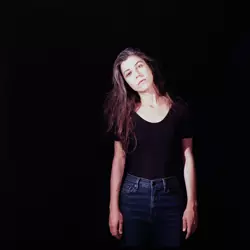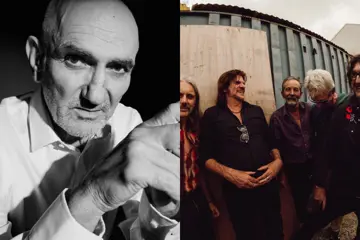 Julia Holter
Julia HolterWhen she was putting together her latest record, Aviary, Holter was reading a collection of short stories by American-Lebanese artist and poet Etel Adnan, Master Of The Eclipse. She says the book “resonated” with her, inspiring her to ponder a question first posed by German philosopher Friedrich Hölderlin in the 18th century, and elucidated by Martin Heidegger in 1946, “What are poets for in these destitute times?”
“That resonated with me feeling not sure what my purpose was as a musician in this world of insanity,” Holter says.
The whole record feels like an attempt to peel apart that question, using different and sometimes grating sonic elements to try to reflect a sense of dissonance.
Holter tries to explore that dissonance musically, using rich synthesisers, organ sounds, and strings, inspired by such disparate sounds as Vangelis’ Blade Runner soundtrack, the music of Alice Coltrane, and the ‘hocketing’ technique used in medieval music, “when different voices interrupting each other creates a rhythmic effect”.
The record then is an attempt to unpack the ambiguity in ‘goodness’, in what is deemed good, musically, and in the world at large.
“There’s a lot of things that I like in music that are also a little painful. I really like the sound of instruments in Every Day Is An Emergency… it’s like a grating sound, the ‘hocketing’ between the high pitches in that track, but I also really enjoy that sound and I enjoy listening to it. And I think that we’re complex as humans and we enjoy things, but also they bring us pain and pleasure, you know? It's confusing and I think that there are these ambiguities that exist that are hard to appreciate when there's so much noise happening.
“I guess in the end what I'm really getting at is love, and what is love and empathy? Just in general, there's so much disagreement on what is a good sound, what is a bad sound, or what is true goodness and what is badness, in a world where people are denying what empathy is.
“I guess in the end what I'm really getting at is love, and what is love and empathy?"
Don't miss a beat with our FREE daily newsletter
“There are a lot of political views for instance that are very prevalent right now, including that of a lot of the US government, that is inherently denying empathy and the existence of it. There's not a lot of empathy, there's not a lot of belief in humans being equal, and [there is a belief in] some being better than others, so all of these things are going through my mind and I think a lot of people's minds about what is empathy?
“Somewhere in there there's also this question for me of what is a good sound and a bad sound, and I'm not sure how all these things connect, but for me in the end, yes, it is maybe as cheesy as I'm trying to find love in a world that's falling apart. What is true empathy? What is true like listening, and over time, there are these obviously different ideas of it and that's maybe why I'm looking to the past to understand.”
Holter says she has lately been looking to history – both of her parents are historians – to “understand a little bit about the patterns of human society, and try to do better. We always fall into cycles so how do we steer ourselves away from certain tendencies?”
Sonically she’s putting her interest in the past into practice, mashing together techniques from the past and present “for poetic purpose”, the hyper-futuristic synth sound of the original ‘80s Blade Runner pushing up against the different, seemingly infinite, approach to the harmony of medieval music.
Aviary also attempts to find a position between the ‘loudness’ of contemporary life, the chaos in always being online and connected, and a need for quiet. “In making this record I definitely, I did not come to it with a clear concept, I was just like I need sound to immerse myself in, like cathartic sound, and I don't know what the answer is. My record is not the answer for people who need silence, but I don't know what I'm even doing. I'm just doing what I guess I needed to do. I don't know to deal with the cacophony so this is my response to it.”















